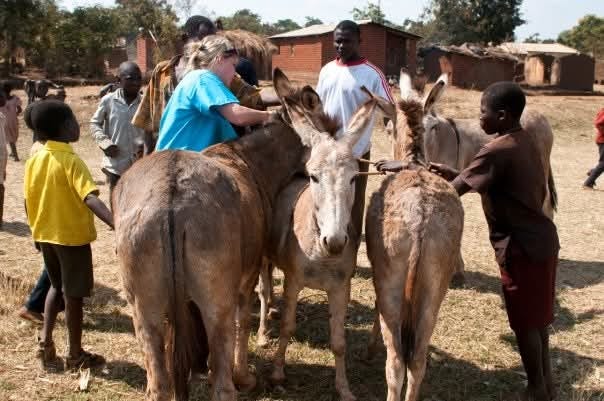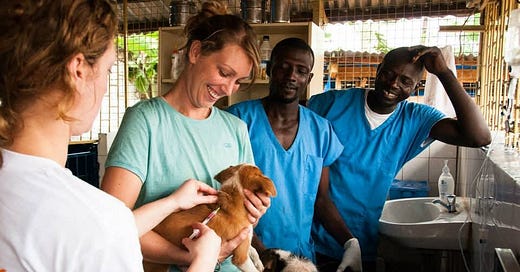International Veterinary Volunteering Programmes
Good intent does not always directly correlate to positive impact. Veterinary professionals can make a real difference when programmes are designed to meet the needs of the communities they serve.
International veterinary volunteering programmes have grown in popularity and scope over the past couple of decades. Previously, those keen to offer their skills abroad might have had to email individual animal charities and arrange their travel themselves, but now, several umbrella organisations offer a range of volunteering opportunities at locations around the world, with websites offering details of dates, costs, and what to pack for trips lasting from a week to several months. Whilst volunteering programmes can be very effective and provide many benefits to the local animal population, there can be downsides that volunteers might not be aware of.

The primary motive for vets and veterinary nurses/technicians to volunteer their skills is frequently the desire to help animals in locations where veterinary care may be limited or absent. For many, the appeal also includes the opportunity to visit another country, work with local people and experience a different culture, often visiting places that most tourists won’t get to see (rubbish dumps scavenged by free-roaming dogs must be high on most bucket lists!), as well as gain experience in treating conditions that may be rarely seen in their home clinics.
For the community and animals living in the area receiving volunteers, the benefits can include better animal health and welfare, particularly for demographics of animals who might otherwise receive limited or no veterinary care, such as unowned dogs in low income countries; a reduction in the spread of zoonotic disease, such as rabies; an increase in income, where farm or working animals are the focus of volunteer efforts; a reduction in unowned animals during mass sterilisation programmes over time; and, in some cases where volunteers provide training to local people, capacity building in animal health services.
While there are many thoughtfully designed and implemented volunteering programmes running in different parts of the world, there are also many instances where programmes fall short of delivering these positive outcomes. Unfortunately, animal welfare can be severely compromised where volunteers do not have sufficient experience to manage the cases they are presented with – for example, unowned dogs presented for sterilisation surgery have an unknown disease history which could lead to surgical complications, such as a prolonged blood clotting time. In these situations, less experienced vets with insufficient supervision, working in an unfamiliar environment, and potentially using anaesthetic protocols and equipment that are different to those from their home clinics, might find themselves in a ‘perfect storm’ which could lead to the injury or death animals, as well as other outcomes, such as the loss of confidence in the programme by the local community, and loss of clinical confidence by the vet.
In other situations, the programme might have been planned without sufficient consultation with the local community to understand their needs, priorities and concerns, leading to mistrust and potentially animals being withheld from receiving treatment. This lack of community engagement and needs assessment in the programme planning phase can also mean that local animal health services are unintentionally undermined, for example by providing free services that removes business from a local veterinary practice. Another risk is in creating a dependency on charitable services which might only be provided for a short period of time, leaving animals without care once the programme has ended.
Furthermore, international veterinary volunteering programmes can occasionally create tension with local communities where ethical values differ between volunteers and community members. Common examples of these are in the attitudes to euthanasia, or to the sterilisation of pregnant animals. These situations require respectful and sensitive handling. Similarly, there have been instances of volunteers acting disrespectfully towards the local community, sometimes voicing their dislike of cultural practices or treating local people as a novelty, taking photos without permission, complaining about the food, and dressing and behaving inappropriately for the local culture.

Many of these negative outcomes can be avoided by good planning on the part of the programme organisers, by doing sufficient community engagement and needs assessment ahead of the programme, ensuring that facilities, equipment and medications provided are suitable for the type of work the volunteers will be engaging in, and selecting suitably experienced volunteers and/or providing adequate supervision and training. Volunteers also need sufficient briefings ahead of the programme, so they know what to expect and are aware of specific cultural sensitivities, while programme managers need to be on site during the work, rather than leaving volunteers to ‘run the show’ unsupported.
Programmes should ideally partner with local animal health services to increase capacity and provide for ongoing care once the programme has finished. They should also target their activities and resources to ensure that they achieve meaningful outcomes, rather than spreading themselves too thinly and failing to meet their objectives – this is especially important in vaccination and mass sterilisation programmes.
Lastly, it is paramount that volunteers take the time to fully understand the programme they are joining, including finding out about the local culture, understanding the scope of the work and considering their skills and capability to ensure the best outcomes for the animals under their care.
With enough care and planning, veterinary volunteering can be hugely rewarding for the volunteers and beneficiaries!
Dr. Kate Shervell is a Veterinary Surgeon who has worked across clinical practice and the non-profit sector, and currently serves in a government policy role. Her background includes experience in International Project Management, Veterinary Science, Animal Welfare, and Policy. Dr. Shervell holds a Bachelor’s Degree in Veterinary Science from University of Bristol, and is currently in the Diploma year of a Masters Degree in International Animal Health at the University of Edinburgh.






Interesting article Kate. I volunteered with the ASPCA to help animals following hurricane Maria. I am a small animal internist, so when it came to having to euthanize a horse (the horse was suffering and I was the only one available), I had to rely on my own equine doc to guide me through the process. Thankfully, things went smoothly.